
UPDATE: February 11 2021
Remediation of non-ACM buildings
In the March 2020 budget, the government announced that it will provide £1 billion in 2020 to 2021 to support the remediation of unsafe non-ACM cladding system on residential buildings 18 metres and over in both the private and social housing sectors.
Figures released by MHCLG yesterday show that the £1 billion non-ACM Building Safety Fund announced in last March’s Budget is hopelessly over-subscribed and is handing out grants of around £2m per block.
Only five private buildings have had funding approved, costing £11.5 million.
A total of 405 are proceeding with an application for funding against 2,322 applications being considered. (498 applications were either ineligible or withdrawn).
If average grants are around £2 million and around 2,000 blocks qualify, then the fund needs to be nearly £4 billion just for the private blocks.
Social housing applications have been much more successful with the Building Safety Fund. A total of 165 have been received and 17 have been approved at a cost of £35.1 million.
Full details are here:
 Loading…
Loading…
The Building Safety Fund only covers cladding, spandrel panels, insulation etc on external walls and nothing internal. So even in the sites receiving the money leaseholders will be paying out.
All these blocks are more than 18 metres high, and if £2 million is the average cost that means leaseholders in blocks not covered by the fund face staggering bills. In a block of 50 flats, it means £40,000 each, for example.
The BBC reports today that a clause in the Building Safety Fund contract indicates that applicants will be financially liable for any repair work not covered by the fund.
Cladding crisis: ‘Delays could bankrupt us’
The government’s fund to pay for the removal of dangerous cladding is woefully inadequate, oversubscribed and taking too long to make buildings safe, campaigners say. More than three and a half years since the Grenfell Tower fire which killed 72 people, an estimated 700,000 people are still living in high-rise blocks with flammable cladding.
Christian Hansen, a solicitor at Bindmans LLP specialising in housing law and fire safety claims, is reported by the BBC stating that the contract showed that “there’s going to be a significant shortfall between the costs of the [repair] works that are required and the funding provided under the scheme”.
“Someone is going to need to pick up the bill and pay the difference. This contract makes clear it’s going to be the leaseholders and for many, this could be tens of thousands of pounds, potentially ruinous costs,” he warned.
Mr Hansen said that leaseholders wanted the focus of government action “to be on the manufacturers of the defective materials and construction companies who built these buildings”.
“At the moment, they are the ones profiting from putting people’s lives at risk.”
The BBC highlights the case of Amy Cottenden, 28, who is a frontline worker with the NHS, and owner of an £85,000 flat in the Metis Tower in Sheffield.
“It is absolutely terrifying knowing that you are stuck here. With lockdown, they are saying not to go out, but you are in a building where all you want to do is not be in it. You can’t leave. You can’t sell. My flat isn’t worth anything until it is made safe.”
A spokesperson for Rendall & Rittner, which manages Metis Tower, said government funding to remove ACM cladding had been approved totalling £6.3m.

Peter Apps, of Inside Housing has taken a leading role in the call for justice over the cladding scandal
However, an application to the same fund to pay for the removal of other types of unsafe cladding was rejected and the company has appealed against that decision.
The company added: “We understand and sympathise with residents and owners about the uncertainty that this situation is causing and will do all we can to assist.”
So far, only 216 buildings with ACM Grenfell cladding have been remediated, of 462 that need fixing.
But around 2,500 other buildings above 18 metres are affected – as well as an uncounted number of low-rise sites below 18 metres, which are ineligible for the Building Safety Fund.
Government has been dragged into addressing the cladding crisis after wasting two years begging freehold owners to “do the decent thing” and pay up for their buildings. Not one investor in freeholds did so.
£400 million was allocated for social housing in May 2018 and £200 million by Communities Secretary James Brokenshire in May 2019 for private housing – this followed huge effort by LKP and the then embryonic cladding groups.
Until this cash became available, cladding remediation was basically stalled. A further £1 billion was allocated to the non-ACM Building Safety Fund in March 2020 just before the Covid lockdown.





 LKP backs Sadiq Khan demand that ALL shared ownership leases to be 999 years
LKP backs Sadiq Khan demand that ALL shared ownership leases to be 999 years





















